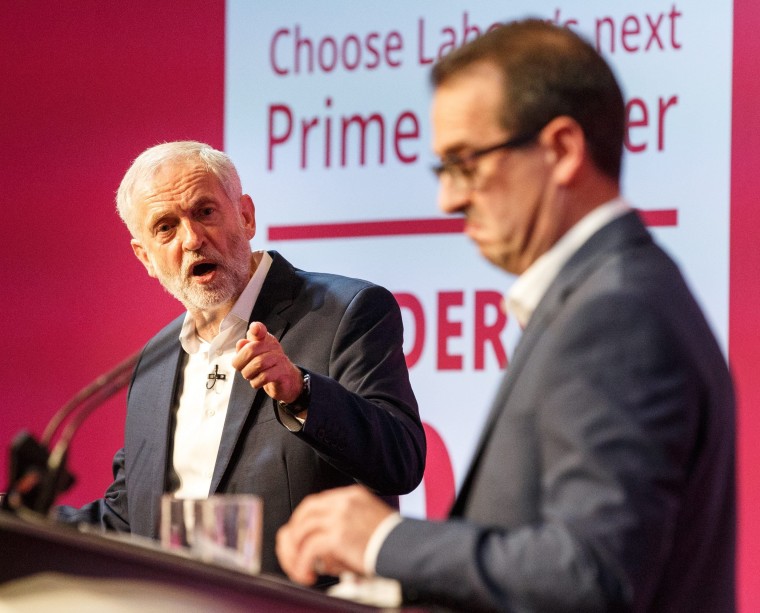LONDON — The turmoil inside the Republican Party under Donald Trump’s divisive candidacy is being mirrored across the Atlantic in Britain, where another outsider is confounding political experts.
The U.K.’s opposition Labour Party on Saturday reelected socialist Jeremy Corbyn as leader, despite warnings from horrified party grandees such as ex-Prime Minister Tony Blair that he is incompetent and will never win a nationwide poll.
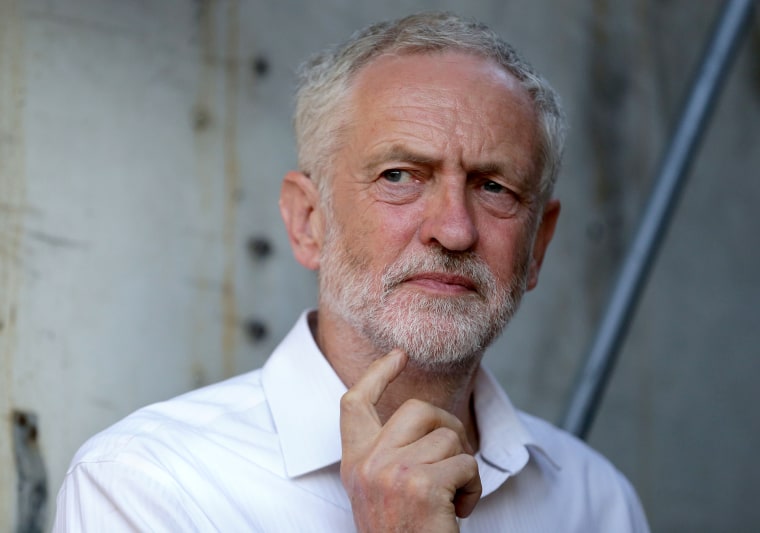
Centrists fear that Corbyn’s emphatic victory, after a bruising and bitter campaign, will keep Labour out of power for a generation and could even trigger a permanent split in the 116-year-old party.
Labour’s woes echo the strife at the other end of the political spectrum across the pond, where several senior GOP figures have refused to endorse their own party’s presidential candidate and fault lines have emerged between lawmakers, donors and grassroots supporters.
Like Trump, Corbyn has broken unwritten elections rules, defying observers who assumed party members would settle on mainstream, voter-friendly establishment candidates.
Related: Beyond Trump – Where Will the Republican Party Go After 2016?
The 67-year-old socialist and peace campaigner has spent his entire career on the sidelines, voting against policies that polls suggest voters would support. He is lukewarm on the U.S. special relationship and is opposed to nuclear weapons — including the costly, U.S.-maintained Trident nuclear missile system.
Corbyn also is a critic of NATO and Israel. In 2009, as patron of the Palestine Solidarity Campaign, he invited members of Hezbollah and Hamas to the House of Commons where he called them “friends” — a term he recently said he regretted using.
And like Trump, Corbyn is wildly popular with his core supporters despite the detractors — more than doubling Labour’s membership registrations over the past year and pulling huge crowds to political rallies.
But his opinion poll ratings among wider voters are historically low. Even in the mid-term of an election cycle, Labour is trailing the ruling Conservatives by an average 10 percentage points.
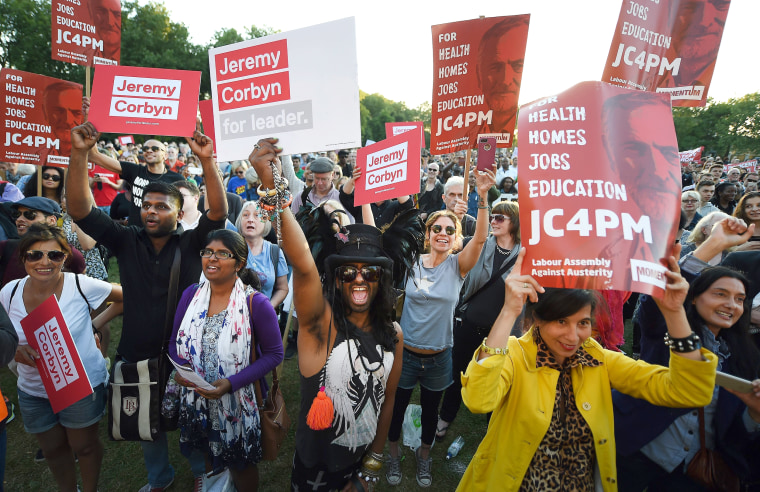
This has left Britain’s opposition engaged in a bitter and vitriolic internal feud that has seen accusations of anti-Semitism and even death threats, giving their rival Conservatives free rein to pursue austerity policies and push through the controversial Brexit from the European Union.
John McTernan, a former Blair adviser and a persistent Corbyn critic, on Wednesday called him “the most woeful, the most useless, the most dangerous and the most unpleasant leader the Labour Party has ever had in its history.”
Party members disagreed this weekend, giving him 61.8 percent of the vote.
Saturday's vote — at the party's conference, which is akin to the conventions in American politics — came after exasperated centrist Labour lawmakers attempted to give Corbyn the boot. In June, 172 Labour members of parliament — almost two-thirds of the entire elected party — declared they had no confidence in the leader.
"This situation is very, very unusual"
Yet his supporters — mostly trade unions and new, ordinary party members — say centrists have misread the public mood. They contend that Corbyn’s low-key style and focus on inequality and social justice — far to the left of Bernie Sanders — represent a refreshing break from establishment politics.
"We have been ... involving people in politics that matters," Corbyn told his supporters at a final rally.
Even with the leadership question settled, the future of the party is far from certain.
“This situation is very, very unusual in British politics,” said Richard Whitman, a professor of politics at the University of Kent in England and a senior fellow at the Chatham House think tank. “Unlike in American politics, the thing you normally need as leader is to retain the confidence of your parliamentary party. When [former Prime Minister] Margaret Thatcher lost the confidence of her members of parliament, she had to go.
“Corbyn is in a position in which the normal rules do not seem to apply and where he’ll be leading a parliamentary party that doesn’t believe in him but where he has support from base activists.”
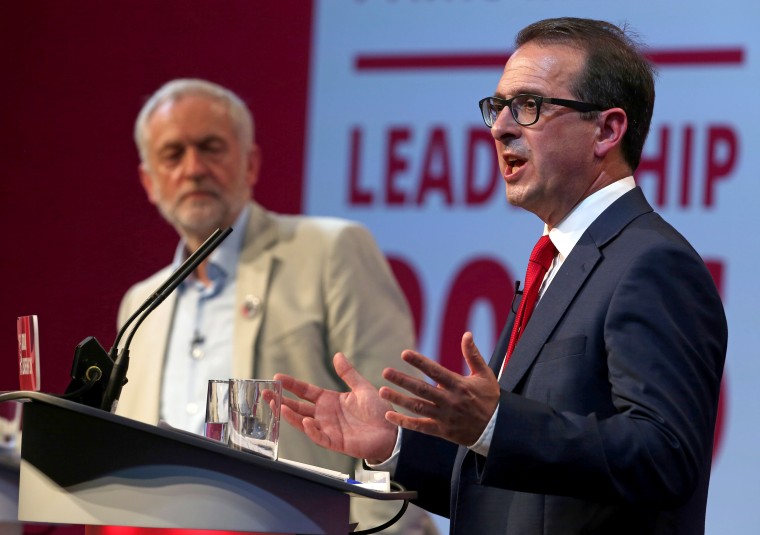
Corbyn’s survival — once considered as unlikely as Trump’s candidacy — leaves Labour pondering its future this weekend as it meets in the northwestern city of Liverpool for its annual conference of members. The meeting promises to be as wild as the Republican National Convention in July, with many predicting the party could split.
“I think the 172 Labour MPs who said they have no confidence in Jeremy Corbyn will be in an untenable position if there’s an election,” said John Ferrett, who leads the ruling Labour group on Portsmouth City Council in Hampshire, England. “At the next election, they’ll be telling voters to choose a prime minister they have no personal confidence in.”
He predicted Corbyn's decisive victory would be “terminal for the Labour Party … it’s going to be very difficult for the centrists to gain control.”
Ferret said Corbyn’s leadership, and his plans to cut spending on defense, had made it difficult to campaign in local elections in Portsmouth, a blue-collar city with a naval history and where many jobs rely on the defense industry. “We had to deal with a lot of hostility on the doorstep during the local elections,” he said.
“Defection would be a dramatic gesture, but each will have to make their own calculations”
Labour’s newly-energized left wing supporters see an opportunity to seize control — and a vitriolic backlash has already begun against centrist lawmakers, including one who has received death threats and reportedly fears for her safety at this weekend’s party conference.
"They behaved like traitors, they are corporatists, not in touch with working people," Mohtashim Shaikh, a 63-year-old retired project manager from southeast London, told Reuters. "The old Labour Party is dead ... Corbyn is the first genuinely honest and honorable leader for decades in this country."
A pro-Corbyn movement, called Momentum, has gained traction on social media with the party’s new activists. It promises to “build on the energy and enthusiasm from the Jeremy Corbyn for Labour Leader campaign to increase participatory democracy, solidarity, and grassroots power and help Labour become the transformative governing party of the 21st century.”
Many are calling for the rebel lawmakers to be deselected from their constituencies, forcing them to re-apply to become Labour candidates — effectively an ideological purge. They view Blair-era centrism as a historical aberration in a party created out of the trade union movement.
Blair — who won three elections for Labour in 1997, 2001 and 2005 and is the party’s only election-winning leader since 1974 — “kept the party faith because he could win elections … but now it appears that the party base doesn’t want to win general elections, they measure success in terms of a wider movement.” That takes its cue from the rise of other European anti-austerity movements such as Podemos in Spain and Syriza in Greece.
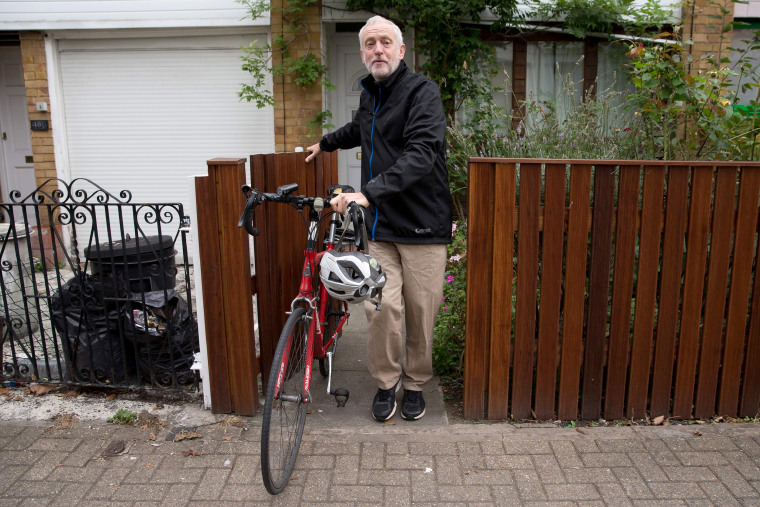
Some moderate lawmakers could defect to form a rival center-left movement, Whitman said. If all 172 rebel members of parliament formed a new party, it would be larger than Corbyn’s Labour and would become Britain’s official opposition for the duration of the current term.
“Defection would be a dramatic gesture, but each will have to make their own calculations,” Whitman said. “If they’re facing deselection then they may defect first for maximum effect, but others may choose to make their peace with Corbyn.”
Meanwhile, Corbyn — who shares Trump’s distrust of the media — has signaled Labour's future direction with a planned appearance at a convention fringe event alongside a Marxist writer.
Former U.K. Foreign Secretary David Miliband, who is now working in New York as the head of the International Rescue Committee, warned Thursday that Labour was further from power than at any time in its history.
That should give some comfort to the GOP. Asked by a reporter at the RNC about the divisions and chaos in the Republican party, Newt Gingrich joked: "Well we’re much better off than the British Labour Party.”
Ferrett, the local Labour councilor, said: “Trump does have a chance of winning the presidency, but there’s next to no chance of Corbyn ever becoming prime minister in the U.K.”
